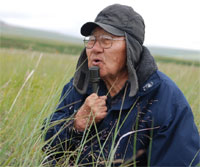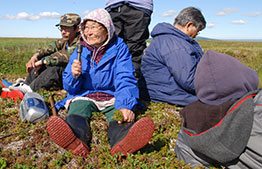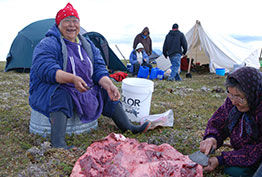Yugtun Qaneryaraput/Our Yup'ik Language
Qaneryarput una power-arpakarput/Our language is a great power to us
Elders we work with always share their knowledge in their Yup'ik language. The wisdom they give thus has double value: It teaches about Yup'ik values and traditions at the same time it does so in uniquely Yup'ik ways, strengthening and passing down Yup'ik oral traditions. Elders are well aware of the power of their language to communicate what English cannot, and they value it.
Lawrence Edmund declared:
"Our language isn't something that we should lose since it was given to us to use. Our language is good since people don't speak of bad things when they speak in Yup'ik.
But now that they're starting to speak in English, they also speak of things that aren't good to hear. Our language is something that we mustn't lose because it will help our young people. Our language is dependent on the land. And these [places] have names in Yup'ik."
Today Yup'ik is the most widely spoken Alaska Native language, with 14,000 speakers out of a population of more than 23,000. This is, however, less than the 17,000 Yup'ik speakers of twenty years ago. Elders fear the loss of their language and encourage their fellows to speak to their children and grandchildren in Yup'ik.
As Nelson Island leader Paul John says:
"The Yup'ik language is powerful and something of great value, which is painful to lose."
Learn more
Qaneryarput una power-arpakarput/Our language is a great power to us
 Una waniwa Agayutem taitellra nakmiin qaneryararput subsistent-aangqerrutekluugcamteggu-llu wangkuta Yup'ik, nerangnaqucingqeluugutekngamteggu, watua nunat ilaitni katagtuq ayagyuaritni. Ayagyuarit qanyuirutut Yugtun.
Una waniwa Agayutem taitellra nakmiin qaneryararput subsistent-aangqerrutekluugcamteggu-llu wangkuta Yup'ik, nerangnaqucingqeluugutekngamteggu, watua nunat ilaitni katagtuq ayagyuaritni. Ayagyuarit qanyuirutut Yugtun.
Taugaam cali teguvingqertut. Tua-i ciulirnerit call' qantuut, tamarmeng maani Kusquqviim unani-ll' cenami qagaani-llu; teguvingqerrsaaquq cali. Kingumeng yuitnun ayagyuateng qanyuirutengraata ciulirnerita kingumeng yuitnun elitnaurutkekunegteggu cukamek eliciiqut.
Tang-ata ayagmek qanyuitqapiarmek aipaqa ut'rutellrulria tayima three weeks nuniini ellirtuq, Yugtun qanyuitkackacagarmek tua-i-w' ellangami yugnek tangvagpek'nani. Ak'a uumirpak ullaglua pinauraanga, qanruteksugnailngatellminek, 'Ap'a nernariuq.' Tuatmell' iliini pinauraanga, 'Ap'a nerqatartukut.' Ak'a elilluni patagmek naseknayagaqtaq.
Tang nunat ilaitni ayagyuarit qanyuirucaaqelriit ciulirnerita qantulit ak'a elitnauqunegteki cukamek eliciiqut. Qaneryarput una power-arpakarput nerlallemta tungiinun yuucimtenun-llu. Tua-i maa-i qaneryararput nangkan subsistence-aalriamek ilairuciiqukut.
Unuamek man'a aperyugpakapiaralqa, ayuqluteng-kiq tua-i nunacuaraat ayagyuateng ataam Yugtun qaneryaurcetqerlitki ataam power-aat teguvkarluku.
Akiilnganan, akituqapigtellriamek akiliusngasterluteng tua-i-w' qantullemteggun Yup'iungamta. Tua-i tua-i qivrunarqeqapiaryaaqut un' qaneryararput mat'utun nunatun, ukanirpak yuut ciuliaeurlumta  yuullracetun.
yuullracetun.
Our Native language that God gave us, since it is the reason why we Yup'ik people also subsist, at this time, in some villages, it has been lost among their young people. Their young people no longer speak in Yup'ik.
But there is a way for them to revive it. All of their elders speak here on the Kuskokwim and in the coastal area down there and upriver; there is still a way to take it back. Although their young people no longer speak, if their elders teach their young people how to speak, they will learn quickly.
You see, three weeks ago now my wife recently brought home someone who didn't speak Yup'ik at all from the beginning, since she didn't become aware around Yup'ik people. Since recently, she's been coming to me and saying [in Yup’ik] something that it doesn't seem she would say, "Grandpa, it's time to eat." And sometimes she'd say to me, "Grandpa, we're going to eat." The little girl has learned quickly.
Although young people in some villages have stopped speaking, if their elders who speak teach them, they will learn quickly. Our language is a big power to us when it comes to eating and to our life. If our language is no more, there will no longer be anyone who subsists among us.
What I've been really wanting to say today, I hope all the small villages have their young people start to speak in Yup'ik again, taking back their power.
It doesn't seem to be of no value, but it is of great value, because of the fact that we speak, because we are Yup'ik people. Our language is something that is painful to lose like our land here, like the way that our dear ancestors lived for centuries.
Paul John, Toksook Bay

Anna Agnus tells the story of the woman buried at Qavaliriyaq, where she died trying to save her daughter from drowning.
Photo Credit: Ann Fienup-Riordan
Martina John using her uluaq, semilunar knife, to remove the blubber from the skin of an amirkaq, young bearded seal, while Anna Agnus works alongside, July 2007.
Photo Credit: Ann Fienup-Riordan


